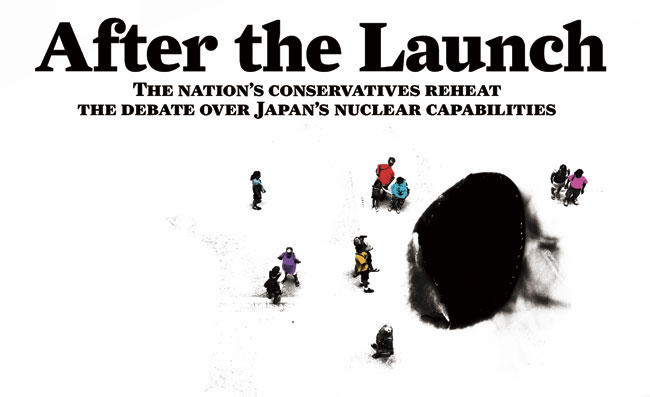In the wake of North Korea's Unha-2 launch Sunday, the Japanese establishment and public have uniformly reacted with a sense of outrage and a desire for an vigorous Japanese and international response to the test.
With substantial public support — 78 percent of respondents in a Yomiuri poll — the government is investigating tightening sanctions and plans to secure a cabinet decision authorizing further sanctions on 10 April. The Aso government is also working with the US and South Korean governments to secure a new UN Security Council resolution condemning North Korea's actions over Chinese and Russian doubts. Sankei reports that in its work to assemble a coalition in support of the resolution, the foreign ministry is not looking for new sanctions to be included in the UN resolution, as a means of making the resolution more attractive to China and Russia.
Other Japanese are thinking beyond sanctions and resolutions. Shoichi Nakagawa, the disgraced former finance minister and leading conservative in the LDP, responded to the launch on Sunday by once again calling for a debate on acquiring nuclear weapons (he most recently did so after the October 2006 nuclear test, when he was head of the LDP's policy research council — at which time Taro Aso, then foreign minister, joined him in calling for a debate on acquiring a nuclear arsenal). To my knowledge, Jiji is the only news outlet that reported on Nakagawa's comments. The Tokyo Shimbun reports that he spoke only of a debate about how Japan can defend itself, suggesting that it should consider acquiring the ability to strike at "enemy bases." I'm inclined to believe that Jiji's report is correct: why would Nakagawa be any more discreet now than he was when he had an official position? No longer a leader of the LDP's conservatives, his words carry less weight, but he still provides insight into how Japan's conservatives think about the region. After all, Nakagawa's remarks echo what Tamogami Toshio, former ASDF chief of staff and the new darling of the right, has said about nuclear weapons. In an interview with Sankei last November, Tamogami spoke of the deterrent effect of even publicly considering the acquisition of nuclear weapons — and suggested that ruling out the acquisition of nuclear weapons from the start weakens deterrence. More recently, in a conversation with defense affairs commentator Masato Ushio (a former ASDF airman, trustee of Sakurai Yoshiko's think tank the Japan Institute for National Fundamentals, and regular in the pages of Sapio, Seiron, and Shokun!), Tamogami calls for the acquisition of ballistic missiles as the best way to negotiate with North Korea and says that "the most effective way for Japan to become an independent country is to be nuclear-armed."
The conservative argument has little to do with North Korea's test, which was once again a failure, albeit less of a failure than in July 2006, when its Taepodong-2 dropped into the Sea of Japan within a minute of launch. This time it managed to drop the first stage before the second and third fell into the Pacific. (Geoffrey Forden considers North Korea's progress in missile development here.) Despite no tangible change in US deterrent capabilities or the US commitment to Japan's defense — by all accounts US-Japan cooperation went smoothly in anticipation of the launch — the conservatives are agitating about Japan's vulnerabilities. For example, The Sankei Shimbun newspaper, in a news article that reads more like an article in a conservative opinion magazine, writes of the "possibility that data collected by the US military will be adequately transfered" to Japan. As Tamogami's remarks above suggest, the acquisition of nuclear weapons is not about — or not only about — their deterrent value. Nor is it about the nature of the North Korean threat, which has gotten no worse as a result of the latest launch (MTC suggests, the missile threat may be less worrisome than the ability of North Korean agents to cause havoc on Japanese soil).
It is be about Japan being able to defend itself without having to worry about the reliability of the US-Japan alliance. Conservatives like Nakagawa and Tamogami would be calling for more robust military capabilities even if the rocket launch had failed immediately after liftoff as in 2006 (We should be thankful that Tamogami is so open with his thoughts).
All that has changed is that for the moment the eyes of the news media and the Japanese people are on North Korea.
Nevertheless, the conservative position has little public support. A new Shin-Hodo 2001 poll found 19.4 percent of respondents in favor of Japan's going nuclear and 72.8 percent in opposition. (By comparison, a Hodo 2001 poll released on 15 October 2006, after the nuclear test, found 82.6 percent opposed to Japan's going nuclear and only 13.8 percent in favor: A slight shift, but for now probably not a significant shift).
But will the legal and economic measures favored by the government and the public make any difference? What can Japan and the other participants in the six-party talks realistically do in response to North Korea's launch, other than protest?
As The Mainichi Shimbun newspaper reports, further sanctions will have little effect due to earlier sanctions on trade between Japan and North Korea. Economic sanctions on North Korea strikes me as the economic equivalent of "making the rubble bounce." The same holds true, even more so, for further US sanctions or even a reversion to a hardline on North Korea. Susan Rice, the US ambassador to the UN, has insisted that if the UN does nothing in response to a clear violation of UNSC Resolution 1718 it will weaken the six-party talks, which may or may not be true but shows that the Obama administration will likely press on with talks, although The Yomiuri Shimbun newspaper claims to see evidence of a US shift to a harder line.
Joshua Stanton suggests that there are a number of tools at the Obama administration's disposal, including a number of financial measures that could choke off the regime's access to hard currency from abroad. Maybe so, but at what cost? As Fred Kaplan argues at Slate, the US has no good options for dealing with the DPRK. The six-party talks will not result in denuclearization, not any time soon at least. Ignoring North Korea raises the prospect that North Korea will up the ante in its bid for attention. Boxing in the regime, as recommended by Stanton, presumably raises the risk of the regime lashing out in desperation — or, worse yet, that the regime will collapse for the US and its neighbors are prepared to deal with the consequences of regime collapse (a contingency that the US and North Korea's neighbors, China especially, should be devoting considerable energy to preparing for). There is no good option available to the US, Japan, and South Korea in the absence of more Chinese pressure, which may not be as viable an option as Kaplan suggests it is.
The only course of action may be getting a token resolution out of the Security Council and delaying a bit before resuming the six-party talks, and preparing for the possibility of regime collapse, in the meantime doing whatever possible to coax North Korea open in the hope of making collapse marginally less dangerous for North Korea's neighbors and less jarring for the downtrodden people of the DPRK.
And as for Japan, it ought to be less worried about its deterrent capabilities than about fixing the defense ministry, which over the weekend once again revealed its problems with handling information.
Originally posted on www.observingjapan.com
Blog:
Other posts by Tobias Harris:







